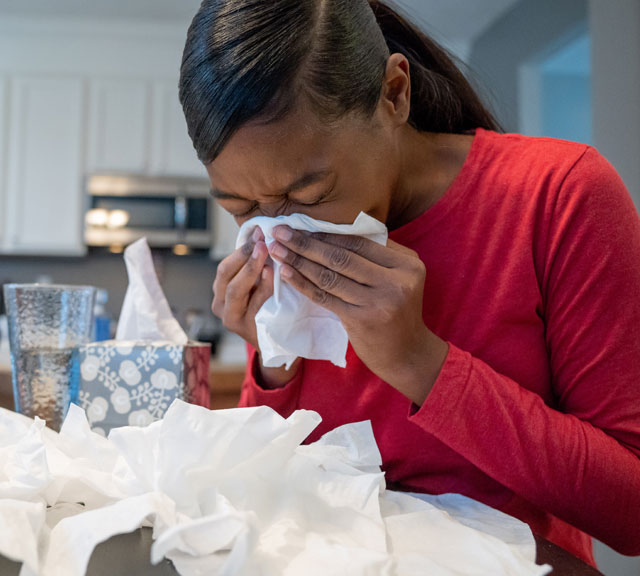Dealing With the All-Too-Common Cold

Answer a few questions and we'll provide you with a list of primary care providers that best fit your needs.
You can feel it coming on. One morning you wake up and something is different. You notice a faint scratchiness in your throat; there may be the hint of a headache, or maybe an unusual tingling, perhaps a slight stuffiness, in your nose.
You recognize the signs: You’ve caught a cold. If you’re right, you might be in for five to 10 days of dealing with all the bothersome symptoms that come along with the common cold: runny nose, sore throat, throbbing head — the whole coughing, blowing, sneezing mess. Wonderful, you think. How did I catch this one, and what will I do to treat my symptoms this time?
It’s not called the common cold for nothing. The cold is the most common illness people get. Most adults slog through two or three of them every year. Children get them even more frequently, coming down with five to seven per year. How do we catch them? What is the best way to manage the symptoms? And what, if anything, can we do to prevent them?
What Is a Cold?
Colds are viral infections. They can be caused by some 200 different kinds of viruses, the most common of which are known as rhinoviruses (the word “rhino” comes from the Greek and means “nose”). We pass them around to each other: Children catch them from their parents, parents from their children, friends from friends, and strangers from each other. Cold viruses can spread in a number of ways:
- You can breathe them in from the air, as can happen if someone with a cold coughs or sneezes near you.
- You can pass the virus into your body through your eyes, nose, or mouth if your hand has a cold virus on it. This can happen if you shake hands with someone who has a cold or touch something, such as a doorknob or other surface, that has some of the virus on it.
Almost all colds involve having a stuffed-up nose. Other common symptoms include:
- Runny nose
- Sneezing
- Sore throat
- Headache
- Cough
Family physician Christopher Lauricella, DO, talks about the viruses that cause the common cold.
Click play to watch the video or read video transcript.
Is It a Cold Or the Flu?
The common cold and the flu share many symptoms in common, but the two illnesses are caused by different viruses. The resulting infections can be hard to tell apart, but in general, symptoms of the flu, which is spread by the influenza virus, are worse than those caused by the common cold. They can include, in addition to the usual cold symptoms, fever and chills, muscle or body aches, and fatigue.
Family physician Josh Ordway, MD, discusses whether a cold can turn into the flu.
Click play to watch the video or read video transcript.
There is no guaranteed way to keep from catching a cold, but you can take steps that will help lessen your chances of contracting a virus.
How Should You Treat a Cold?

Colds cannot be cured, so treatment is largely a matter of managing the symptoms until the infection works its way out of your system. These treatments might include:
- Decongestant. Many decongestant medications are available without a prescription. They may help reduce your stuffy or runny nose symptoms.
- Prescription or nonprescription nasal sprays. These can help reduce nasal symptoms, including stuffiness.
- Prescription or nonprescription pain medication. These can help relieve headaches and sore throat.
- Good self-care. This can include getting extra rest, using a humidifier, and drinking more fluids.
Follow all package directions when taking medications, and if you have any questions about using cold medicines safely, call your health care provider. You should also seek out further advice from your provider if you have any of the following:
- A fever of 100.4°F (38°C) or higher, or as directed
- Cough, chest pain, or shortness of breath that gets worse
- Symptoms that don’t improve or that get worse after about 10 days
- Headache, sleepiness, or confusion that gets worse
Can Colds Be Prevented?
There is no guaranteed way to keep from catching a cold, but you can take steps that will help lessen your chances of contracting a virus. To help reduce your chances of getting a cold, do the following:
- Any time you think you might have come into contact with a cold virus, wash your hands well —for at least 20 seconds. If you can’t wash with soap and water, use an alcohol-based hand sanitizer. Regular handwashing can help protect you from getting sick.
- Avoid touching your nose, eyes, or mouth, especially if you think you may have touched something that could have a cold virus on it.
- Stay away from people who are sick. Viruses that carry the common cold can pass through close contact with others.
- Disinfect things you touch often, such as phones and keyboards.
Answer a few questions and we'll provide you with a list of primary care providers that best fit your needs.
Source: Centers for Disease Control and Prevention; Josh Ordway, MD, Springboro Family Medicine; Christopher Lauricella, DO, Premier Health Family Care - North








